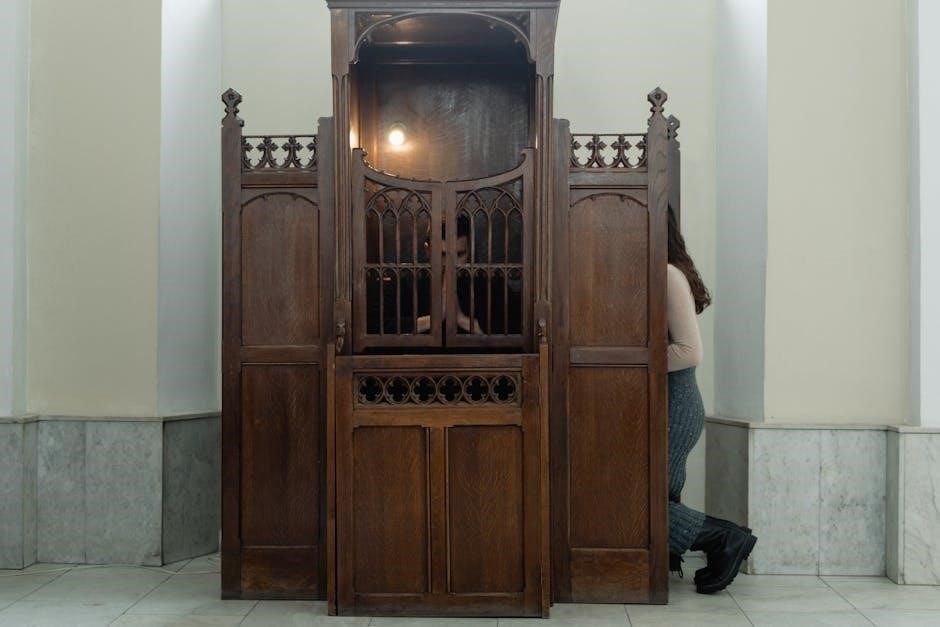The Catholic Confession Guide for Adults provides a step-by-step approach to understanding and participating in the Sacrament of Reconciliation, fostering spiritual growth and forgiveness through prayer and reflection.
What is Catholic Confession?
Catholic Confession, also known as the Sacrament of Reconciliation, is a sacred ritual where Catholics seek forgiveness for their sins. It involves examining one’s conscience, expressing contrition, and confessing sins to a priest, who acts in persona Christi to grant absolution. This sacrament fosters spiritual healing, renewal, and a deeper connection with God. It is a cornerstone of Catholic spirituality, emphasizing the importance of humility, repentance, and the Church’s role in mediating God’s mercy.
Importance of Confession for Adults

Confession is a vital sacrament for adults, offering spiritual healing and renewal. It provides an opportunity to acknowledge sins, express true contrition, and receive God’s forgiveness through the priest. By examining their consciences and confessing, adults deepen their relationship with God, fostering humility and self-awareness. This sacrament also strengthens moral resolve, helping adults avoid future sins and grow in holiness. Regular confession promotes emotional and spiritual well-being, allowing individuals to experience reconciliation and peace. It is a powerful means of encountering Christ’s mercy and living a life aligned with Catholic teachings, essential for ongoing spiritual growth and a deeper commitment to faith;
Benefits of Regular Confession
Regular confession offers numerous spiritual and emotional benefits for adults. It fosters a deeper relationship with God by consistently seeking forgiveness and grace. Frequent confession helps individuals develop self-awareness, accountability, and humility, leading to personal growth. It also strengthens the ability to resist sin and make better moral decisions; Regular confession provides emotional relief by unburdening the conscience and promoting inner peace. Additionally, it enhances prayer life and sacramental participation, deepening one’s connection to the Church and community. By prioritizing regular confession, adults can experience spiritual renewal, gain clarity in their faith journey, and live a more authentic, compassionate, and grace-filled life aligned with Catholic teachings.

Understanding the Sacrament of Reconciliation
The Sacrament of Reconciliation, also known as Confession, is a sacred ritual where Catholics seek forgiveness for sins, restoring their relationship with God and the Church community.
The Purpose of the Sacrament
The Sacrament of Reconciliation, or Confession, serves as a divine encounter where Catholics experience God’s mercy and forgiveness. Its primary purpose is to heal the spiritual wounds caused by sin, restoring one’s relationship with God and the Church. Through this sacrament, individuals acknowledge their shortcomings, express genuine sorrow, and receive absolution, freeing them from the burden of guilt. It also fosters personal conversion, encouraging believers to live a more virtuous life. By reconciling with God, Catholics are strengthened in their faith, renewed in spirit, and empowered to grow closer to Christ. This sacrament embodies God’s infinite love and desire for humanity’s salvation, offering peace and spiritual renewal.
Key Elements of a Good Confession
A good Confession consists of several essential elements that ensure its effectiveness and spiritual value. First, an honest examination of conscience is crucial to identify one’s sins and their seriousness. This reflection helps individuals acknowledge their faults and take responsibility. Next, contrition, or genuine sorrow for sinning, is necessary to receive forgiveness. This must be expressed verbally during Confession. The confession of sins itself should be clear, specific, and complete, avoiding vague statements. Finally, the priest imposes a penance, which serves as a means of making amends and growing in holiness. These elements together foster a sincere and meaningful sacramental experience, leading to spiritual healing and renewal.
The Role of the Priest in Confession
The priest plays a vital role in the sacrament of Confession, acting as a representative of Christ and the Church. He listens to the penitent’s sins, offers spiritual guidance, and provides absolution. The priest’s authority comes from Christ, enabling him to forgive sins in His name. He also helps the penitent understand the gravity of their actions and provides appropriate penance to aid in spiritual growth. The priest must maintain the Seal of Confession, ensuring confidentiality. His role is not to judge but to heal and reconcile the penitent with God and the Church. Through his ministry, the priest facilitates divine forgiveness and supports the individual’s journey toward holiness and inner peace.

Preparing for Confession
Preparing for Confession involves prayer, reflection, and an honest examination of conscience to identify sins and understand their impact on one’s relationship with God.
Examination of Conscience

An examination of conscience is a reflective process to identify sins and weaknesses, helping adults prepare for Confession. It involves prayerfully reviewing actions, thoughts, and omissions in light of Catholic teachings;
Guides often categorize sins, such as offenses against God, others, and oneself, to aid honesty and clarity. This practice fosters accountability and readiness to seek forgiveness and healing.
Steps to Prepare Your Heart and Mind

Preparing for Confession begins with prayer, seeking God’s grace to examine oneself honestly. Create a quiet, reflective environment to focus on your intentions and openness to healing.
- Reflect on your relationship with God, others, and yourself since your last Confession.
- Ask the Holy Spirit to reveal areas where you have fallen short or need improvement.
- Resolve to amend your life and avoid future sins, fostering true contrition.
This spiritual preparation helps you approach Confession with sincerity and readiness to receive God’s mercy and guidance.
Using an Examination of Conscience Guide
An Examination of Conscience guide helps adults identify and reflect on their sins thoughtfully. These tools, often found in Catholic prayer books or online, provide questions and prompts to evaluate actions, thoughts, and omissions against the Ten Commandments, Beatitudes, and virtues. By systematically reviewing your life since your last Confession, you can better recognize areas needing repentance. Use the guide prayerfully, asking the Holy Spirit for clarity and honesty. This preparation fosters genuine contrition and ensures a fruitful Confession. Regular use strengthens self-awareness and deepens your relationship with God, making the sacrament more meaningful and transformative.

The Confession Process
The Confession process involves a step-by-step encounter with God’s mercy. It includes entering the confessional, greeting the priest, confessing sins, receiving penance, and absolution.
Step-by-Step Guide to Confession
Begin by entering the confessional and greeting the priest. Kneel or sit, depending on the setup, and start with a prayer or simply state your intention to confess. Clearly and honestly confess your sins, no matter how small they seem. Be specific about the number and nature of your sins, as this helps the priest provide guidance; After confessing, the priest will offer words of encouragement and assign a penance to perform as a means of healing and growth. Listen carefully and accept the penance. The priest then prays the words of absolution, forgiving your sins in God’s name. Finally, thank the priest, leave the confessional, and fulfill your assigned penance.
What to Say During Confession
When confessing, begin by greeting the priest and stating the last time you confessed. For example, “Bless me, Father, for I have sinned. It has been [X] days/weeks/months since my last confession.” Clearly and humbly state your sins, avoiding excuses or minimizing their seriousness. After confessing, express genuine sorrow by saying, “I am sorry for these and all my sins.” The priest may offer guidance or ask questions to clarify. Conclude with the Act of Contrition, praying, “My God, I am sorry for my sins with all my heart…” Finally, accept the penance the priest assigns and thank him before leaving. Be sincere and concise in your words.
Options for Confession (Behind a Screen or Face-to-Face)
Confession can be conducted behind a screen or face-to-face, depending on the penitent’s preference. The traditional method involves an anonymous confession behind a screen, ensuring privacy and focusing solely on the sins confessed. This option is particularly comforting for those who feel shy or embarrassed. On the other hand, face-to-face confession allows for a more personal and direct encounter with the priest, fostering a deeper spiritual connection. Both methods are valid and respected in the Catholic Church. The choice depends on individual comfort and the desire for anonymity or pastoral guidance. Ultimately, the goal is to humbly confess sins and receive God’s mercy.

Common Challenges and Solutions
Adults often face challenges like fear, embarrassment, or difficulty recalling sins. Prayer, examination guides, and trust in God’s mercy can help overcome these obstacles, fostering sincerity and peace.
Overcoming Fear or Embarrassment
Fear or embarrassment can hinder adults from confessing their sins. Recognize that confession is a sacrament of healing, not judgment. Priests are bound by confidentiality and are there to offer guidance, not condemnation. Remind yourself that God already knows your sins and desires your repentance. Prayer can help calm nerves, asking for courage and sincerity. Using an examination of conscience guide can also prepare you mentally. Remember, embarrassment fades, but the peace from reconciliation lasts. Regular confession fosters humility and strengthens your relationship with God. Approach the sacrament with trust, knowing it’s a step toward spiritual growth and deeper faith.
Dealing with Forgotten Sins
Forgetting sins during confession is common, but it’s important to address it. If a sin comes to mind after confession, include it in your next confession. Forgotten sins are still forgiven if you’re truly sorry for all your sins. To minimize forgetting, use an examination of conscience guide beforehand. Reflect on your thoughts, words, and actions. If you recall a serious sin later, confess it as soon as possible. Remember, God sees your heart, and sincerity matters more than recalling every detail. Don’t let forgotten sins discourage you—focus on growing in honesty and contrition. Regular confession helps foster self-awareness and reduces the likelihood of overlooking sins in the future.
Struggling with Contrition
Contrition, or true sorrow for sin, is essential for a fruitful confession. Many adults struggle to feel genuine remorse, especially for habitual sins. To cultivate contrition, reflect on the gravity of your actions and how they offend God. Pray for the gift of sorrow, asking the Holy Spirit to deepen your repentance. Acknowledge that even imperfect sorrow, when expressed sincerely, is acceptable. If feelings of contrition are lacking, confess this difficulty to the priest. Remember, contrition is a gift from God, and He desires your honest heart, not just emotional feelings. Regular prayer and reflection on God’s mercy can help nurture true contrition over time.

After Confession
After confession, experience the peace of forgiveness and renewal. Focus on fulfilling your penance and growing spiritually, avoiding sin and deepening your faith in God.
Understanding Forgiveness
Understanding forgiveness is central to the Catholic sacrament of reconciliation. Forgiveness is a divine act of mercy, where God absolves sinners of their guilt, restoring their relationship with Him and the Church. Through confession, believers receive pardon for their sins, experiencing spiritual healing and renewal. Forgiveness is not merely a human act but a gift from God, offered through the priest’s absolution. It liberates the soul from the burden of sin, allowing for a fresh start in living a virtuous life. While forgiveness removes guilt, it doesn’t eliminate all consequences of sin, which may require penance or restitution. True forgiveness fosters gratitude, inspiring believers to avoid sin and grow in holiness.
Performing Penance
Performing penance is a vital part of the sacrament of reconciliation, serving as an act of atonement for sins committed. After receiving absolution, the priest assigns a specific penance, which may include prayers, good works, or reflections. Penance helps the individual express sorrow, repair harm caused by sin, and grow in holiness. It is not a punishment but a means to deepen conversion and strengthen spiritual resolve. By fulfilling the assigned penance, the faithful demonstrate their commitment to amendment and reconciliation with God and the Church. This practice fosters personal growth and prepares the soul to live more virtuously in the future.
Continuing Spiritual Growth
Continuing spiritual growth after confession involves nurturing a deeper relationship with God and living a life of virtue. Regular prayer, reflection, and participation in the sacraments are essential. Engaging in acts of charity, fasting, and devotional practices can strengthen spiritual habits. Reading scripture and the teachings of the Church provides guidance for daily living. Seeking spiritual direction or joining faith communities can offer support and accountability. By consistently striving to follow Christ’s teachings, individuals can grow in holiness and become more compassionate and grace-filled versions of themselves. Spiritual growth is a lifelong journey, and confession serves as a powerful tool to aid in this ongoing transformation.

Additional Resources
Discover additional resources, including downloadable PDF guides, from official Catholic websites and publishers, offering comprehensive confession tips and spiritual support for adult faith journeys.
Catholic Confession Guides for Adults
Catholic confession guides for adults are invaluable resources for deepening one’s faith and understanding the sacrament of reconciliation. These guides, often available as downloadable PDFs, provide step-by-step instructions, reflections, and practical advice to help adults prepare for confession. Many guides include examinations of conscience tailored to adult life circumstances, such as relationships, work, and personal spirituality. They also offer insights into overcoming common challenges, like forgetting sins or struggling with contrition. Additionally, some guides include prayers, scripture references, and tips for making confession a meaningful experience. User-friendly and concise, these resources are perfect for both regular confessors and those returning to the sacrament after a long absence. They serve as powerful tools for spiritual growth and renewal, helping adults navigate their faith journey with confidence and clarity.
Prayers for Before and After Confession
Prayers before and after confession are essential for preparing the heart and mind, fostering a spirit of repentance and gratitude. Many Catholic confession guides include specific prayers to help adults enter a reflective state. The Prayer Before Confession is often recommended to seek God’s guidance and clarity; After confession, prayers like the Act of Contrition and Prayer of Thanksgiving reinforce forgiveness and renewal. These prayers, found in Catholic confession guides, help individuals express remorse, acknowledge God’s mercy, and commit to spiritual growth. They serve as powerful tools to deepen the sacramental experience and nurture a closer relationship with God, both before and after receiving the sacrament of reconciliation.
Recommended Reading and References
For a deeper understanding, several resources are recommended. The Catechism of the Catholic Church provides foundational teachings on the sacrament. The Confession Handbook by Fr. Thomas Morrow offers practical advice for adults. Reconciliation: A Pocket Guide by Fr. Michael Muller simplifies the process. The Sacrament of Reconciliation by Fr. James Barker explores its theological depth. These guides, available in PDF formats, are invaluable for spiritual growth. Additionally, the Vatican’s official documents on reconciliation and various Catholic websites offer insights and prayers. These resources enrich the experience of confession, helping adults embrace the sacrament’s transformative power and deepen their faith journey.
